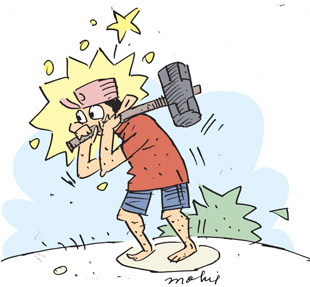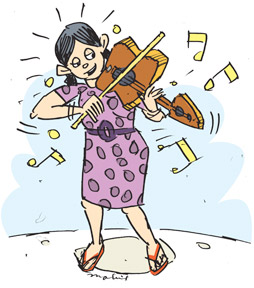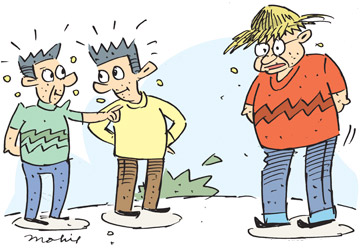|

by R. S. Karunaratne
Relative clauses with ‘which’
|

He bought a hammer which is very heavy. |
We use a relative clause with “which” to describe anything other than
people.
John killed the cobra which bit his brother.
I have been to the new theatre which is impressive.
Do you know the planet which is nearest to the sun?
Laura works at a bank which is near my house.
He bought a hammer which is very heavy.
A relative clause with ‘which’ should have a subject and a finite
verb.
Smoking is a bad habit which is ruining his health.
Thelma attends a tuition class which is run by a retired teacher.
Everybody prayed for the success of the peace talks which were in
progress.
We gazed at the Indian ocean which looked peacefull.
I sent a photograph to a magazine which published it on the cover page.
‘Which’ can be used as the object of a sentence.
You have the skills which the job requires.
It was a rare disease which many specialists failed to diagnose.
A defining relative clause with ‘which’ identifies the things
referred to.
I am reading the novel which my friend borrowed from the library.
People collected the handbills which were distributed.
I did some yoga exercises which were not very strenuous.
We moved to a new house which is far away from the city.
A non-defining relative clause does not identify the things referred to.
It gives more information.
Note: Always put a comma before a non-defining relative clause.
|

Nethmi is playing the violin, which is a lovely instrument. |
Nethmi is playing the violin, which is a lovely instrument.
I have been to your university, which is very impressive.
A relative clause beginning with ‘that’ can describe all nouns including
people.
I am writing a book about the poets that I have read.
You can write an essay about the places of worship that you have
visited.
A non-defining relative clause cannot begin with ‘that.’
Ramani tried a new hairstyle, which looked nice.
[Activity]
Join the following sentences using relative clauses. Check your
answers with the key.
1. A boy was injured in the accident.
He is now in hospital.
....................................................
2. A waiter served us.
He was polite and patient.
....................................................
3. Some suspects were arrested.
They have been released.
....................................................
4. The train leaves for Maho.
It is always late.
.....................................................
5. A house was destroyed in the floods.
It has now been rebuilt.
.....................................................
6. Lakmini works for a company.
It publishes newspapers.
....................................................
7. The story is about a girl.
She runs away from home.
.....................................................
8. A dictionary is a book.
It gives the meaning of words.
......................................................
9. The police have arrested a man.
He was on the roof.
......................................................
10. Alexander Graham Bell was the man.
He invented the telephone.
......................................................
Key:
1. The boy who was injured in the accident is now in hospital.
2. The waiter who served us was polite and patient.
3. The suspects who were arrested have been released.
4. The train that leaves for Maho is always late.
5. The house that was destroyed in the floods has been rebuilt.
6. Lakmini works for a company that publishes newspapers.
7. The story is about a girl who runs away from home.
8. A dictionary is a book that gives the meaning of words.
9. The police have arrested a man who was on the roof.
10. Alexander Graham Bell was the man who invented the telephone.
Starters:
How to use prepositions
[Part 16]
Although there are only about 100 prepositions, starters find it
difficult to use them correctly. Here’s a guide.
Of
|

He was wearing a hat made of straw. |
We use ‘of’ after nouns referring to amounts or groups.
She bought three bottles of milk.
We have to follow a complicated set of rules.
Anoma has read three of my books.
The younger of the two men comes from Jaffna.
We use ‘of’ when mentioning a date.
He died on the 17th of May, 2010.
We use ‘of’ to indicate the type or group we are talking about.
This is a new kind of dictionary.
He is suffering from a certain type of illness.
Some intransitive verbs are typically followed by ‘of.’
approve, beware, boast, complain, conceive, consist, despair,
disapprove, dispose, dream, hear, know, learn, partake, savour, smack,
smell, speak, think, weary.
Similarly, some transitive verbs are followed by ‘of.’
absolve, accuse, acquit, advise, assure, avail, balk, cheat, cleanse,
convict, convince, cure, denude, deprive, disabuse, divest, inform,
make, notify, purge, warn.
There are some adjectives which are usually followed by ‘of.’
afraid, appreciative, apprehensive, ashamed, aware, beloved, bereft,
capable, certain, characteristic, conscious, contemptuous, critical,
devoid, empty, enamoured, envious, expressive, fearful, fond, forgetful,
free, frightened, full, guilty, ignorant, impatient, incapable,
independent, indicative, insensible, jealous, mindful, nervous,
possessed, protective, proud, scared, sceptical, scornful, short,
unaware, uncertain, unconscious, unsure, unworthy, wary, weary, worthy.
We use ‘of’ when indicating somebody’s age.
A man of 80 has applied for the post of gardener!
A girl of 18 joined the music class yesterday.
We use ‘of’ to indicate the materials something is made of.
The room is divided by a partition of glass and wood.
He was wearing a hat made of straw.
We use ‘of’ to indicate what illness or injury caused somebody’s
death.
Hema died of heart failure.
In the past, many people died of malaria.
We use ‘of’ to show possession.
I didn’t know that she was a friend of yours.
The President of the United States visited Israel recently.
Some employees of the company are entitled to an annual bonus.
Have you read the Complete Works of Shakespeare?
We use ‘ of’ in expressions showing position.
There’s a bank on the corner of the street.
We use ‘of’ to indicate a characteristic of a person.
The stranger had the face of a demon!
Off
‘Off’ means ‘away from.’
Keep off the grass!
All the leaves are dropping off the tree.
The child fell off a trishaw.
Do you know where to get off?
I am not living far off Colombo.
‘Off’ is used in the sense ‘removed.’
The lid of the jar came off.
I ate a big piece off the cake!
Will you please take your feet off the seat?
Get off me! (Don’t touch me!)
When somebody is off work, they do not work.
My secretary is off today.
If you keep off a subject, you do not talk about it.
Let’s keep off politics!
When a radio or television station goes off the air, it stops
broadcasting.
The British Broadcasting Services goes off the air at midnight.
Adjectives from nouns
Words often come in families. You can expand your vocabulary by
becoming familiar with these word families. In the following quiz we
give 25 nouns in Column ‘A’. Write the relevant adjectives in Column
‘B’. The first one has been done for you. Check your answers with the
key.
Column A Column B
1. Hair hairy
2. Hand .............
3. Hangar .............
4. Happiness .............
5. Hardship .............
6. Harm .............
7. Head .............
8. Health .............
9. Hearing .............
10. Heart .............
11. Heat .............
12. Height .............
13. Help .............
14. Height .............
15. History .............
16. Home .............
17. Honesty .............
18. Hope .............
19. Humanity .............
20. Hunger .............
21. Hurry .............
22. Hurt .............
23. Identification .............
24. Imagination .............
25. Importance .............
Key:
2. underhand 3. hanging 4. happy 5. hard 6. harmful 7. heady 8.
healthy 9. unheard 10. hearty 11. heated 12. heightened 13. helpful 14.
high 15. historic 16. homely 17. honest 18. hopeful 19. human 20. hungry
21. hurried 22. unhurt 23. identifiable 24. imaginable 25. important |


